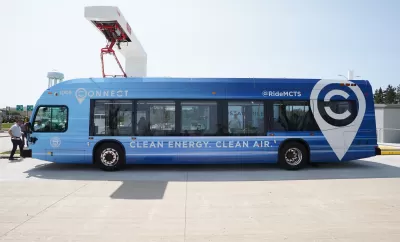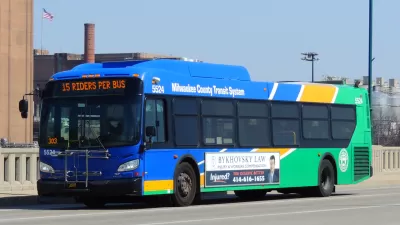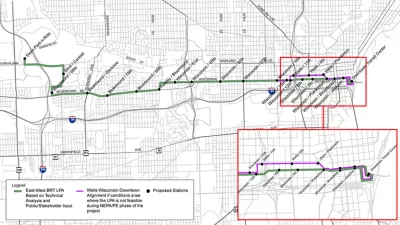The newly opened line is already reaching pre-pandemic ridership levels.

Milwaukee’s newest bus rapid transit (BRT) line is bringing transit riders back to the Milwaukee County Transit System (MCTS), reports Graham Kilmer in Urban Milwaukee, with an average of 2,800 riders per day—slightly more than 2019 ridership on the same corridor, pre-BRT.
Achieving pre-pandemic ridership levels is an achievement for any transit agency, as numbers continue to stagnate on many of the nation’s biggest systems. “Since MCTS began designing the new service it has estimated that by 2035 Connect 1 will average approximately 9,500 riders a day.”
Kilmer adds that “Since launching, the top destinations along the Connect 1 have been Downtown Milwaukee (700 rides per day), Marquette University (500 rides per day) and the Milwaukee Regional Medical Center (200 rides per day).” Connect 1 is also the first line in the system to use Battery Electric Buses (BEB), with “clean-diesels” serving as backup for peak times.
Rides on Connect 1 are free through the end of September.
FULL STORY: BRT Line Records Big Ridership Numbers

Planetizen Federal Action Tracker
A weekly monitor of how Trump’s orders and actions are impacting planners and planning in America.

San Francisco's School District Spent $105M To Build Affordable Housing for Teachers — And That's Just the Beginning
SFUSD joins a growing list of school districts using their land holdings to address housing affordability challenges faced by their own employees.

The Tiny, Adorable $7,000 Car Turning Japan Onto EVs
The single seat Mibot charges from a regular plug as quickly as an iPad, and is about half the price of an average EV.

Seattle's Plan for Adopting Driverless Cars
Equity, safety, accessibility and affordability are front of mind as the city prepares for robotaxis and other autonomous vehicles.

As Trump Phases Out FEMA, Is It Time to Flee the Floodplains?
With less federal funding available for disaster relief efforts, the need to relocate at-risk communities is more urgent than ever.

With Protected Lanes, 460% More People Commute by Bike
For those needing more ammo, more data proving what we already knew is here.
Urban Design for Planners 1: Software Tools
This six-course series explores essential urban design concepts using open source software and equips planners with the tools they need to participate fully in the urban design process.
Planning for Universal Design
Learn the tools for implementing Universal Design in planning regulations.
Smith Gee Studio
City of Charlotte
City of Camden Redevelopment Agency
City of Astoria
Transportation Research & Education Center (TREC) at Portland State University
US High Speed Rail Association
City of Camden Redevelopment Agency
Municipality of Princeton (NJ)





























